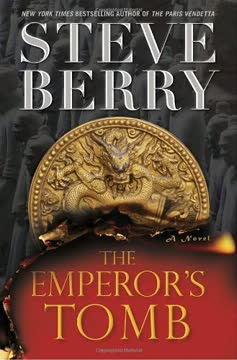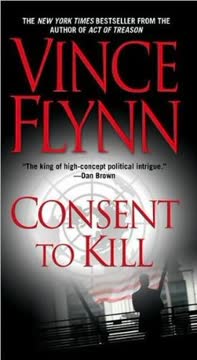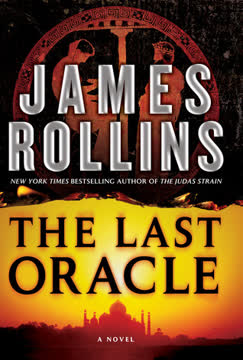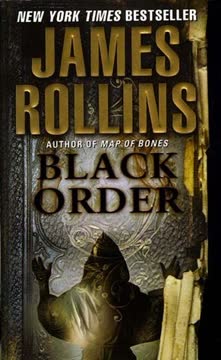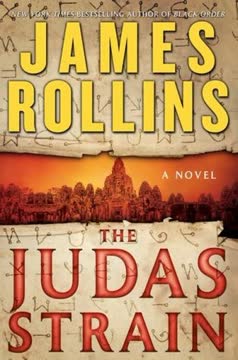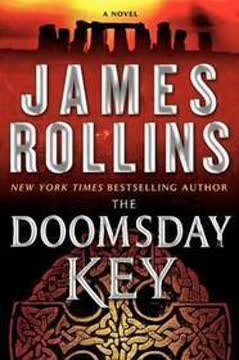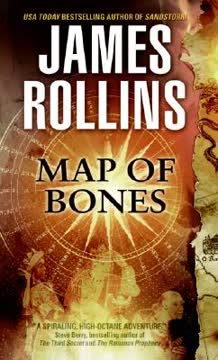Plot Summary
Pyramid Secrets Unveiled
In 1799, Napoleon Bonaparte, at the height of his ambition, enters the Great Pyramid at Giza, seeking enlightenment and power. Accompanied by his trusted savant Monge, he meets a mysterious Egyptian who demands the "oracle." The encounter is shrouded in secrecy and ends in violence, as Napoleon orders Monge to kill the Egyptian to protect the secret. This prologue sets the tone for the novel's obsession with hidden knowledge, ancient codes, and the ruthless pursuit of power. The pyramid becomes a symbol of the eternal quest for legacy, and the secrets Napoleon uncovers will echo through centuries, entwining with the destinies of those who seek his lost treasure.
Vendetta Ignites in Copenhagen
Cotton Malone, a former U.S. agent turned bookseller in Copenhagen, is thrust back into danger when Sam Collins, a desperate ex-Secret Service agent, breaks into his shop, pursued by professional killers. The attack is linked to Henrik Thorvaldsen, Malone's enigmatic Danish friend, who is embroiled in a personal vendetta. The violence reawakens Malone's dormant instincts and unresolved trauma from a past mission in Mexico City, where he failed to save a friend's son. The chapter sets up the emotional stakes: Malone's struggle with guilt, Thorvaldsen's thirst for justice, and the shadowy forces manipulating global events from the shadows of Europe.
Corsican Shadows and Gold
Lord Graham Ashby, a British aristocrat and financier, pursues the legendary Rommel's gold, lost since World War II, on the rugged island of Corsica. He manipulates local informants and employs violence to extract secrets, using the Moor's Knot cipher to decode clues hidden in a Napoleonic memoir. Ashby's obsession with lost treasures is both a family legacy and a desperate bid to salvage his crumbling fortune. The Corsican vendetta motif—betrayal, revenge, and the price of secrets—runs deep, foreshadowing the deadly games to come as Ashby's path converges with Malone and Thorvaldsen.
The Paris Club Conspiracy
Eliza Larocque, a formidable French-Corsican heiress, recruits Robert Mastroianni, an Italian industrialist, into the Paris Club—a clandestine group of the world's wealthiest financiers. Over a luxurious transatlantic flight, she reveals the club's true purpose: to profit from global chaos by orchestrating economic crises and wars, echoing the methods of the Rothschilds and Napoleon's own disdain for debt. The club's origins are rooted in ancient papyri, allegedly found by Napoleon, which outline the philosophy of ruling through fear and manufactured threats. The Paris Club's machinations threaten to destabilize nations, and their next move will have catastrophic consequences.
Night Assaults and Old Wounds
After the assault on his bookshop, Malone and Collins race to warn Thorvaldsen, only to find him prepared for violence at his ancestral estate. Thorvaldsen's grief over his murdered son, Cai, is palpable, and his quest for vengeance against Ashby and Cabral, the men responsible, consumes him. The emotional weight of loss and the moral ambiguity of revenge are explored as Thorvaldsen and Malone cross lines they once swore never to cross. The chapter deepens the psychological complexity of the protagonists, setting them on a collision course with the Paris Club and their own inner demons.
The Oracle's Prophecy
Eliza Larocque's family heirloom, the Book of Fate—an oracle once owned by Napoleon—becomes a tool for decision-making within the Paris Club. The oracle's cryptic answers shape the club's strategies and reinforce Larocque's belief in destiny. Meanwhile, the narrative flashes back to Napoleon's Egyptian campaign, where he witnesses brutality and discovers coded papyri that will later inspire the Paris Club's philosophy. The interplay of fate, prophecy, and free will becomes a recurring motif, as characters seek meaning and justification for their actions in the face of chaos and uncertainty.
Treacheries Across Continents
Ashby's duplicity is revealed as he manipulates both the Paris Club and his own allies, including his mistress Caroline Dodd, to further his quest for Napoleon's lost cache. In London, he meets with the enigmatic assassin Peter Lyon, arranging a terrorist spectacle to eliminate his rivals and secure his fortune. Meanwhile, Malone and Stephanie Nelle, his former boss, uncover Ashby's double game and the Paris Club's plans for a spectacular attack in Paris. The web of intrigue tightens, with every character forced to choose between loyalty, survival, and ambition.
The Ghosts of Mexico City
Malone's recurring nightmares of a massacre in Mexico City, where he failed to save Thorvaldsen's son, haunt his every move. The emotional scars drive both men's actions as they confront the reality that justice and revenge are often indistinguishable. The chapter explores the cost of violence—on the soul, on friendships, and on the possibility of redemption. As the past bleeds into the present, Malone and Thorvaldsen must decide how far they are willing to go to right old wrongs, even as new threats loom.
The Hunt for Rommel's Gold
Ashby, aided by the Moor's Knot cipher and Caroline's historical expertise, finally locates Rommel's gold, hidden in Corsica since WWII. The treasure, however, is tainted by betrayal and bloodshed, as Ashby eliminates his Corsican informants and secures the gold for himself. The episode serves as a microcosm of the novel's larger themes: the corrupting influence of greed, the futility of violence, and the illusion of control. Ashby's triumph is short-lived, as his financial woes and enemies close in, setting the stage for the final confrontation in Paris.
The Paris Club Gathers
On Christmas Day, the Paris Club convenes in the exclusive Gustave Eiffel Room, high above the city. Larocque unveils her plan to profit from orchestrated terror attacks, manipulating markets and public fear. Ashby, plotting his own betrayal, arranges for a plane loaded with explosives to crash into the Eiffel Tower, intending to eliminate the club and claim their fortunes. Malone, Stephanie, and Sam Collins infiltrate the gathering, racing against time to prevent catastrophe. The tension between personal vendetta and global stakes reaches its zenith as alliances fracture and the true nature of power is revealed.
The Tower and the Trap
Malone, risking his life, boards the explosive-laden plane midair and diverts it from the Eiffel Tower, saving the Paris Club but exposing Ashby's treachery. The failed attack shatters the club's unity, and Larocque vows revenge. Meanwhile, Peter Lyon, the assassin, turns on Ashby, seeking payment and retribution. The chapter is a masterclass in suspense, blending action with psychological drama as each character's true motives are laid bare. The aftermath leaves the survivors reeling, with old debts unpaid and new vendettas born.
The Final Code
The quest for Napoleon's lost cache leads Malone, Thorvaldsen, Ashby, and their adversaries to the Basilica of Saint-Denis, burial place of French kings. Deciphering a series of biblical psalms and the Moor's Knot, they discover a hidden chamber filled with gold, jewels, and imperial relics. The treasure, however, is overshadowed by violence, as Peter Lyon and Ashby's ambitions collide with Thorvaldsen's thirst for justice. The ancient codes, once symbols of enlightenment and power, become instruments of destruction, forcing each character to confront the true cost of their obsessions.
The Basilica Reckoning
In a rain-soaked, shadowy Saint-Denis, the final confrontation unfolds. Thorvaldsen, consumed by grief and rage, corners Ashby, intent on avenging his son's death. Peter Lyon intervenes, killing both Ashby and Thorvaldsen in a brutal exchange. Sam Collins, wounded but resolute, faces down Lyon and, in a moment of courage, ends the assassin's reign. The scene is a crucible of emotion—loss, guilt, and the fleeting hope of redemption. The vendetta that began with a son's murder ends in blood, leaving only questions about the price of justice and the possibility of peace.
The Price of Vengeance
As the dust settles, Malone, Stephanie, and Sam grapple with the aftermath of violence. Thorvaldsen's death leaves a void, and Malone is haunted by the final words exchanged with his friend. The survivors reflect on the choices that led them here—the compromises, betrayals, and sacrifices made in the name of justice. The treasure, once the object of obsession, is now a symbol of all that was lost. The chapter is a meditation on the limits of vengeance and the enduring power of friendship, even in the face of irreparable loss.
The Treasure's True Heir
With the Paris Club dismantled and Larocque in custody, Malone and Sam oversee the recovery of Napoleon's treasure. The French government claims the cache, its origins too murky to trace, and the gold becomes a national relic rather than a private fortune. Larocque, defiant to the end, warns that the cycle of conspiracy and manipulation will continue. The novel closes the loop on centuries of secrets, suggesting that the true legacy of power is not wealth, but the stories we tell—and the debts we owe—to the past.
The End of the Vendetta
In the aftermath, Malone, Sam, and Meagan Morrison reflect on the events that have changed their lives. Sam, now a full-fledged agent, carries the scars of his first kill and the lessons of courage and loyalty. Malone mourns Thorvaldsen but finds solace in the friendships forged through adversity. The vendetta that began with Napoleon's secrets and a father's grief ends with the hope that history's cycles can be broken, if only for a moment. The final scenes are bittersweet, acknowledging the cost of justice and the possibility of redemption.
Aftermath and Legacy
The novel's epilogue contemplates the enduring allure of conspiracy, the dangers of unchecked ambition, and the fragile nature of truth. Napoleon's cache, the Paris Club's schemes, and the personal vendettas that drove the characters are all subsumed by the relentless march of history. The survivors are left to pick up the pieces, haunted by what they have done and what they have lost. The story ends not with triumph, but with a quiet reckoning—a recognition that the past is never truly buried, and that the search for meaning is both a curse and a gift.
Characters
Cotton Malone
Malone is a former U.S. agent turned bookseller, whose quiet life in Copenhagen is shattered by violence and old debts. Driven by guilt over his failure to save Thorvaldsen's son in Mexico City, Malone is both a reluctant hero and a man in search of redemption. His relationships—with Thorvaldsen, Stephanie Nelle, and Sam Collins—are marked by loyalty, regret, and the constant tension between duty and conscience. Malone's psychological arc is defined by his struggle to reconcile the demands of justice with the cost of violence, and his journey is as much about healing as it is about solving the mystery of Napoleon's lost cache.
Henrik Thorvaldsen
Thorvaldsen is a Danish billionaire, philanthropist, and collector, whose life is defined by loss—the murder of his son Cai in Mexico City. His quest for vengeance against Ashby and Cabral is both personal and symbolic, a stand against the impunity of the powerful. Thorvaldsen's relationships are complex: he is a mentor to Malone, a benefactor to Sam, and a formidable adversary to his enemies. Psychologically, he is torn between the desire for justice and the corrosive effects of hate, and his ultimate sacrifice is both tragic and redemptive, ending the vendetta but at the cost of his own life.
Graham Ashby
Ashby is a British lord and financier, obsessed with lost treasures and desperate to salvage his failing fortune. His charm masks a ruthless pragmatism, and he is willing to betray anyone—friends, lovers, and allies—to achieve his goals. Ashby's relationship with Caroline Dodd is transactional, and his alliance with the Paris Club is opportunistic. Psychologically, he is driven by fear of irrelevance and a need to prove himself, but his inability to trust or love ultimately leads to his downfall. Ashby's arc is a cautionary tale about the dangers of unchecked ambition and the emptiness of material success.
Eliza Larocque
Larocque is the formidable leader of the Paris Club, a woman whose intellect and will are matched only by her belief in destiny. Descended from Corsican aristocrats and lifelong enemies of Napoleon, she is driven by a desire to vindicate her family's legacy and reshape the world through calculated chaos. Her relationships are transactional—she recruits, manipulates, and discards allies as needed. Psychologically, she is both a true believer and a pragmatist, using the oracle and ancient codes to justify her actions. Larocque's arc is a study in the seductions and perils of power, and her ultimate defeat is both a personal and philosophical reckoning.
Sam Collins
Sam is a young, recently disgraced Secret Service agent, whose conspiracy theories and outsider status make him both a liability and an asset. His relationship with Malone is initially one of hero-worship, but he grows into his own as he faces danger and moral ambiguity. Sam's connection with Meagan Morrison is a source of vulnerability and growth, and his loyalty to Thorvaldsen is tested by the demands of the mission. Psychologically, Sam is defined by his search for purpose and acceptance, and his first kill marks a loss of innocence that will shape his future as an agent.
Stephanie Nelle
Stephanie is Malone's former boss and the head of the Magellan Billet, the U.S. Justice Department's covert operations unit. She is a master strategist, unflappable under pressure, and willing to make hard choices for the greater good. Her relationship with Malone is built on mutual respect and occasional friction, and she serves as a moral compass for the team. Psychologically, Stephanie is adept at compartmentalizing emotion, but she is not immune to guilt or regret. Her arc is one of leadership in crisis, navigating the competing demands of justice, politics, and personal loyalty.
Peter Lyon
Lyon is a chameleon-like killer, hired by Ashby and Larocque to orchestrate terror and eliminate rivals. His shifting identities, cold logic, and love of psychological games make him a formidable antagonist. Lyon's relationships are purely transactional—he serves only himself, and his loyalty is to money and survival. Psychologically, he is a sociopath, fascinated by fear and control, and his confrontations with Malone, Sam, and Thorvaldsen are tests of will and nerve. Lyon's death at Sam's hands is both a victory and a loss of innocence for the young agent.
Meagan Morrison
Meagan is the real force behind the GreedWatch website, a conspiracy theorist whose intelligence and courage belie her outsider status. Her relationship with Sam is marked by mutual attraction and shared risk, and she plays a crucial role in exposing the Paris Club's plans. Psychologically, Meagan is driven by a need to make a difference and to be seen, and her willingness to act—despite fear—makes her a vital ally. Her arc is one of transformation, from observer to participant, and her actions help tip the balance in the final reckoning.
Caroline Dodd
Caroline is Ashby's mistress and intellectual partner, whose expertise in history and codes is instrumental in deciphering Napoleon's secrets. Her loyalty to Ashby is tested by his betrayals, and her own survival instincts come to the fore as the danger escalates. Psychologically, Caroline is both ambitious and vulnerable, seeking validation through her work and her relationship. Her fate is ultimately tragic, a casualty of the larger games played by those around her.
Cai Thorvaldsen
Cai, Henrik's son, is present only in memory, but his murder in Mexico City is the emotional engine of the novel. His death haunts both his father and Malone, shaping their actions and their willingness to cross moral lines. Psychologically, Cai represents lost potential and the enduring pain of grief, and his presence is felt in every act of vengeance and every moment of doubt. His memory is both a burden and a source of strength for those who loved him.
Plot Devices
The Moor's Knot and Ancient Codes
The Moor's Knot, a cipher involving page and line numbers from a shared text, is the key to unlocking both Rommel's gold and Napoleon's lost cache. The use of biblical psalms, raised letters, and historical references creates a layered puzzle that propels the narrative. These codes serve as both literal plot devices and metaphors for the characters' search for meaning, legacy, and justice. The interplay of ancient wisdom and modern technology underscores the novel's themes of continuity and change.
Dual Timelines and Flashbacks
The narrative structure weaves together historical episodes—Napoleon's campaigns, the origins of the Paris Club, the massacre in Mexico City—with present-day action. Flashbacks provide context and emotional depth, allowing the reader to understand the psychological scars that drive the characters. This device also creates suspense, as secrets from the past are gradually revealed, shaping the choices and fates of the protagonists.
Foreshadowing and Prophecy
The Book of Fate, Napoleon's oracle, and recurring dreams serve as foreshadowing devices, hinting at future betrayals, deaths, and revelations. Characters interpret these prophecies in ways that justify their actions, blurring the line between fate and free will. The tension between what is foretold and what is chosen is a central theme, explored through both plot twists and character arcs.
Multiple Points of View
The story unfolds through the eyes of Malone, Thorvaldsen, Ashby, Larocque, Sam, and others, allowing the reader to experience events from multiple angles. This device creates dramatic irony, as the audience knows more than any one character, and it amplifies the sense of conspiracy and uncertainty. The shifting viewpoints also humanize the antagonists, revealing the fears and motivations behind their actions.
The Vendetta Motif
The Corsican vendetta—an endless cycle of revenge and retribution—serves as both a plot device and a psychological motif. Characters are driven by old debts, personal losses, and the desire to settle scores, often at the expense of their own happiness and morality. The vendetta structure creates a sense of inevitability, as each act of violence begets another, and the only escape is through sacrifice or forgiveness.
Analysis
Steve Berry's The Paris Vendetta is a masterful blend of historical intrigue, modern conspiracy, and psychological drama. At its core, the novel interrogates the nature of power—how it is acquired, maintained, and lost—and the human cost of pursuing justice through violence. The story's intricate plot, weaving together Napoleon's secrets, the machinations of the Paris Club, and the personal vendettas of its protagonists, serves as a meditation on the dangers of unchecked ambition and the seductive allure of conspiracy. Berry's use of ancient codes and oracles highlights the enduring human desire to find meaning in chaos, while the psychological depth of his characters—especially Malone and Thorvaldsen—grounds the narrative in real emotion. The novel warns against the cyclical nature of revenge, the corrupting influence of greed, and the ease with which ideals can be subverted by fear. In a world where history is both weapon and shield, The Paris Vendetta challenges readers to consider what is truly worth fighting for, and at what cost.
Last updated:
Review Summary
The Paris Vendetta receives mixed reviews, with an average rating of 3.94 out of 5. Many readers praise Berry's blend of history and thriller elements, particularly the Napoleon-related plot. Some find the book fast-paced and exciting, while others criticize its complexity and slow start. Fans appreciate the character development and historical details, but some feel it doesn't live up to previous entries in the series. The novel's focus on revenge and financial conspiracies divides readers, with some enjoying the new direction and others missing the traditional treasure hunting aspects.
Cotton Malone Series
Similar Books
Download PDF
Download EPUB
.epub digital book format is ideal for reading ebooks on phones, tablets, and e-readers.




